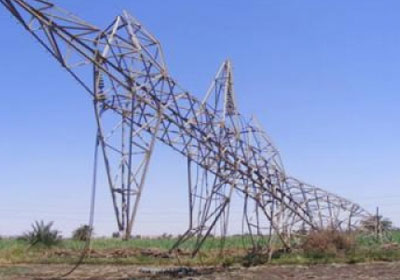
Government officials in Marib (oil rich eastern province of Yemen)confirmed on Monday that saboteurs used explosives to damage power-lines and interrupt the delivery of electricity to the capital, Sana'a as well as the immediate area.
According to informations obtained by Saba (state news agency), gunmen led by Hassan Mabkhoot assaulted Marib electricity towers twice early on Monday in al-Damashqa, plunging Sana'a into total darkness.
Hassan Mabkhoot, the alleged ring leader of a local tribal militia is believed to have arranged and ordered the kidnapping of Marib Deputy General of the electricity station. The man also threatened he would carry out attacks against the power plant if his demands were not met by the central government.
Local tribesmen have often used the targeting of local infrastructures to force the government into complying with their wishes: the release of fellow tribesmen from prison, the payment of indemnities or on occasions the resolution of land disputes.
As a result of the sabotage, Sana'a residents said they has once again to revert to using fuel-powered generator to meet their electricity needs, putting a strain on their finances.
UN Special Envoy to Yemen, Jamal Benomar noted in his most recent report to the UN Security Council he believed loyalists to former President Ali Abdullah Saleh were using such sabotage missions to undermine the authority of the transition government and spread instability.
Moreover, gunmen blew up Marib main oil pipeline "partially interrupting the flow of crude oil," noted a local official on Monday.
"Unknown saboteurs blew up the pipeline at dawn at kilometre 35 (mile 22) in Wadi Abida" added the official under anonymity.
With Yemen depending so much its oil revenues to finance its budget (70 to 75%) such attacks are threatening the country's abilities to heal its battered economy.
Similar acts of sabotage in the province of Marib cost Yemen in 2012 a reported $1 billion.
In July 2012, Petroleum and Minerals then-Minister Hisham Abdullah Sharaf said Yemen had lost more than $4 billion in revenues since February 2011 as a result of such attacks.